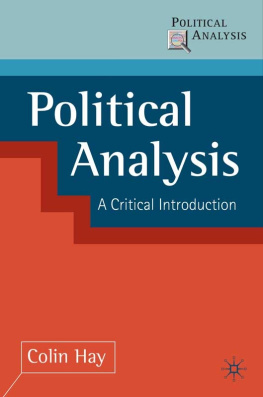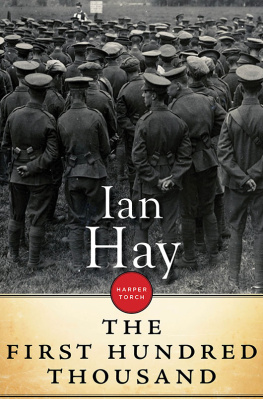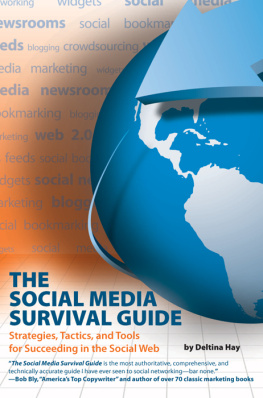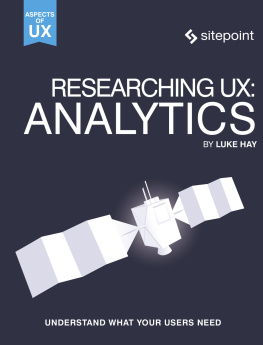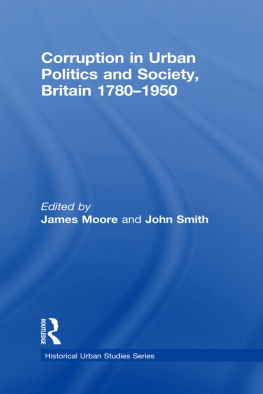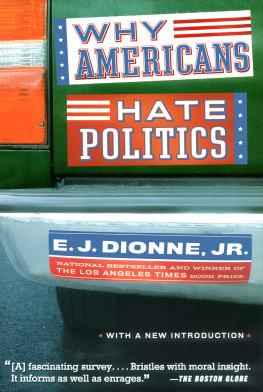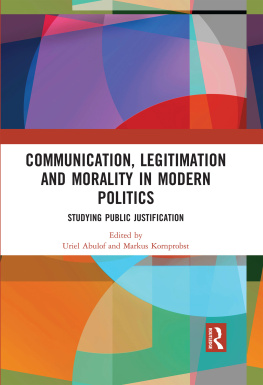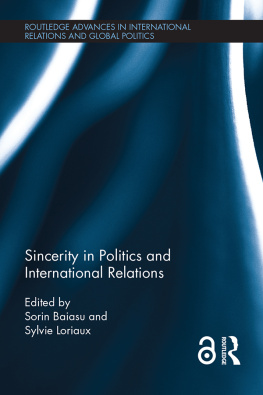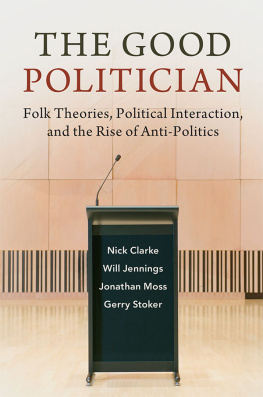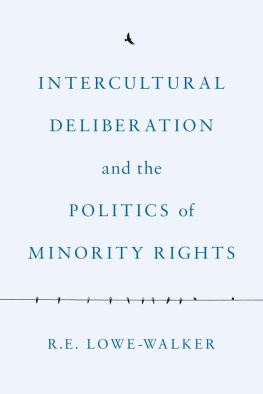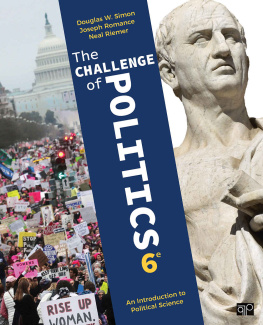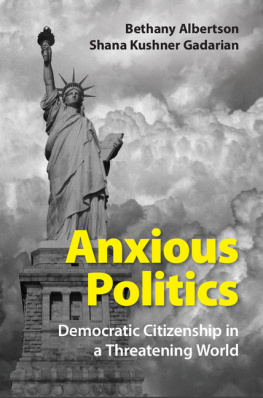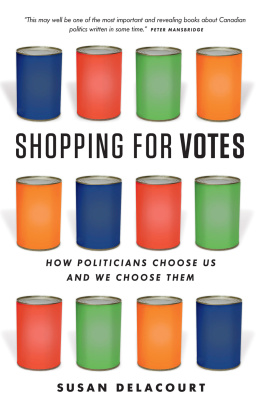Why We Hate Politics
For Ailsa and Ian
Why We Hate Politics
COLIN HAY
polity
Copyright Colin Hay 2007
The right of Colin Hay to be identified as Author of this Work has been asserted in accordance with the UK Copyright, Designs and Patents Act 1988.
First published in 2007 by Polity Press
Polity Press
65 Bridge Street
Cambridge CB2 1UR, UK
Polity Press
350 Main Street
Malden, MA 02148, USA
All rights reserved. Except for the quotation of short passages for the purpose of criticism and review, no part of this publication may be reproduced, stored in a retrieval system, or transmitted, in any form or by any means, electronic, mechanical, photocopying, recording or otherwise, without the prior permission of the publisher.
ISBN-13: 978-0-7456-5742-4
A catalogue record for this book is available from the British Library
The publisher has used its best endeavours to ensure that the URLs for external websites referred to in this book are correct and active at the time of going to press. However, the publisher has no responsibility for the websites and can make no guarantee that a site will remain live or that the content is or will remain appropriate.
Every effort has been made to trace all copyright holders, but if any have been inadvertently overlooked the publishers will be pleased to include any necessary credits in any subsequent reprint or edition.
For further information on Polity, visit our website www.polity.co.uk
Contents
Figures and Tables
Figures
Tables
Preface and Acknowledgements
This book has taken rather longer to write than I had hoped, just like the last one, and the one before that and, almost certainly, the one before that (I forget). When the idea for this book, or at least a book somewhat like this, was first put to me by Louise Knight, I was about to begin a three-year tenure as Head of the Department of Political Science and International Studies (POLSIS) at the University of Birmingham. I accepted enthusiastically the offer to submit a proposal, both because I was excited about the prospect of sorting out in my own mind the nature of the contemporary condition of political disaffection and disengagement and because this was the kind of book that I could imagine writing as Head of Department. That was to prove a forlorn hope. It has been far more difficult and more challenging intellectually to sort out my previously rather disparate thoughts on the issues addressed in this volume than I had thought likely. And the process has taken me in some genuinely new directions. It also became clear, rather early on, that I was profoundly nave to think that I was going to write anything very much as Head of Department. But the book is probably better for its rather lengthy gestation. It is certainly the case that when I eventually sat down to consign my thoughts to paper at the start of my period of sabbatical in the Department of Government at the University of Manchester, I was far clearer about what I was seeking to do. The months that have followed have proved unusually cathartic.
As this perhaps already implies, I have, as usual, amassed a great variety of debts, both personal and intellectual, in writing this book. I must first thank my colleagues in POLSIS. It is not their fault that I failed to write this book whilst acting as their Head of Department indeed, they have contributed greatly to making that a far less legitimate excuse for my inability to meet my publishers deadlines than it would normally be in British higher education today. I must also thank my friends, new and old, in the Department of Government at the University of Manchester, who have accommodated my sabbatical but who have, by virtue of this book, seen rather less of me than they might have expected. Now that it is completed, I hope to rectify that and to repay as best I can their generosity. An innumerable array of friends and colleagues have shaped, often unbeknownst to them, my ideas on the issues that I address in this volume. Amongst those who spring immediately to mind are the following, whom I thank profusely: Sam Ashman, Stephen Bates, Mark Blyth, Jim Buller, Pete Burnham, Keith Dowding, Alan Finlayson, Matthew Flinders, Andrew Gamble, Bob Goodin, Peter Hall, Andrew Hindmoor, Chris Howell, Laura Jenkins, Steven Lukes, Ross Maloney, Dave Marsh, Mick Moran, Pippa Norris, Craig Parsons, Ben Rosamond, Heather Savigny, Nicola Smith, Hugh Ward and Matthew Watson. It is almost inevitable that the day this book goes to press I will recall another dozen names that should be on this list I thank them too, equally profusely and trust that they will excuse my notoriously appalling memory. I am also immensely indebted to three anonymous readers for Polity, each of whose thoughtful, supportive and yet probing comments led to significant improvements, I think, in the final manuscript. I must also thank Louise Knight, Ellen McKinlay and, latterly, Emma Hutchinson at Polity. It was Louise who first put the idea to me for this volume, and I am immensely grateful to her for that especially now that the book is complete! But I would also like to thank all three for their dedication, support and, above all, their enthusiasm for the project as it has developed and for their patience and perseverance. Whilst on the subject of patience and perseverance, this book, like all the others, would simply not have been written without the love and support of Elspeth. It is testimony to her generosity, kindness and tolerance that she has read almost every word and commented on almost every page.
Finally, it is now well over four years since the completion of my last single-authored book, Political Analysis. Since then I have become a father twice. This book is, appropriately enough, dedicated to Ailsa (now four) and Ian (six months). I guess that, like any father and author, I hope that one day they will be interested to see what I have written. Yet I have one further hope namely, that if they do, they will scarcely recognize the description of the condition of political disaffection and disengagement from which it builds.
Colin Hay
May 2006, Macclesfield
Political Disenchantment
Politics, or so it seems, is not all that it was once cracked up to be. Despite its near global diffusion, democracy motivates a seemingly ever smaller proportion of the electorate to exercise its right to vote in the states in which that right has existed the longest. Levels of electoral participation amongst the young are particularly low, and, it appears, each successive cohort of new voters has a lower propensity to vote than the previous one. Moreover, despite the bitter, often bloody and almost always protracted struggle to acquire the right to vote in free, fair and open elections, levels of participation in the new democracies are scarcely less depressing. Nowhere, it seems, does politics animate electorates consistently and


